Patrick Kanouse's Blog, page 42
June 25, 2013
Anniversary: The 12th Follow Up
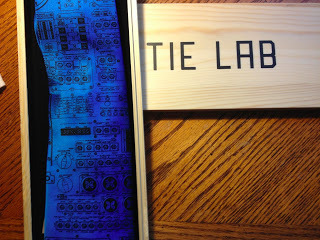 Every year for our anniversary, Gina and I incorporate the traditional anniversary gifts. Sometimes the gift features the traditional item; sometimes the traditional item is somehow incorporated. In the traditional lists, year 12 is listed as either silk or linen. Gina decided to do both this year (I went with silk only).
Every year for our anniversary, Gina and I incorporate the traditional anniversary gifts. Sometimes the gift features the traditional item; sometimes the traditional item is somehow incorporated. In the traditional lists, year 12 is listed as either silk or linen. Gina decided to do both this year (I went with silk only).So for silk, she bought me this awesome tie! The pattern is an image from the Apollo 15 cockpit controls (as seen shown in the manual).
For linen, she bought me these embroidered handkerchiefs. Two of them feature our initials and one features our anniversary date. Wonderful!
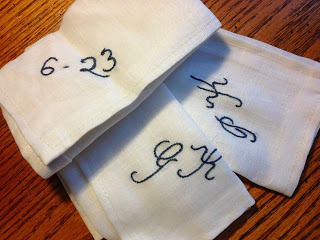
Published on June 25, 2013 04:12
June 23, 2013
Anniversary: The 12th
 Every year I have the pleasure of writing a blog post on Gina's and my anniversary. This year we are celebrating our 12th! I find it difficult to not write the normal platitudes of how fortunate I am, how awesome my spouse is, and how these have been an amazing 12 years. And all of that is true, but I always want some better way to say it, something that is as unique as we are, something that I can be as proud of as I am proud of her. Every year words fail me.
Every year I have the pleasure of writing a blog post on Gina's and my anniversary. This year we are celebrating our 12th! I find it difficult to not write the normal platitudes of how fortunate I am, how awesome my spouse is, and how these have been an amazing 12 years. And all of that is true, but I always want some better way to say it, something that is as unique as we are, something that I can be as proud of as I am proud of her. Every year words fail me.So this year, I will say that I find myself fortunate to be married to the person I want to spend the rest of my years with. No one can make me laugh as much as Gina can--whether her own silliness or others. No one can inspire me more to create and be better. No one who I can share everything with. She makes my world better because she is so amazing.
Published on June 23, 2013 04:00
June 20, 2013
Cascade Point: A Review
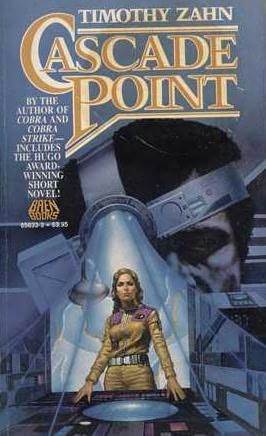 I've been busy working on a novella, so I've been reading a few more to see how some authors approach the work (I've been reading Larry Niven's Flatlander book with several novellas). I had never read Timothy Zahn's Hugo-winning novella before.
I've been busy working on a novella, so I've been reading a few more to see how some authors approach the work (I've been reading Larry Niven's Flatlander book with several novellas). I had never read Timothy Zahn's Hugo-winning novella before.Pall Durriken is captain of a low-class passenger starship called the Aura Dancer. In Cascade Point, interstellar travel is accomplished via a hyperspace of some sort called Colloton space. One aspect of this space is that those who are awake during it witness themselves in parallel universes stretching out infinitely. Thus, Durriken, who is awake for the first jump, witnesses himself sitting in the navigator's chair over and over again--sometimes in a luxury passenger liner's captain's uniform. The effects of Colloton space can be psychologically depressing. Fortunately, most people sleep through it or are on much more financially enriched ships that can afford an auto-navigator. Zahn goes into a lot of detail about how interstellar travel works, noting that the size of the ship, its shape, and the volume of ming metal (a alloy with specific properties) influences the jump.
When psychiatrist Dr. Hammerfeld Lanton and his patient, Rik Bradley, join the flight, however, things go awry. Lanton hopes to learn if Colloton space and assist Bradley in a recovering. He fails to note or simply doesn't know (in the novella he claims to not know) that one of his devices contains ming metal, and that unshielded ming metal results in a the Aura Dancer not just traveling through space but through universes. As the crew works to figure out how they return to their own universe, questions arise on how it will affect Bradley, who had demonstrated some improvement.
The story is quite simple in that the ship flies out and flies back and in the intervening travel determine that it has switched universes and then working their way back. Two characters are really the focus of the novella: Durriken and his first mate Alana Keal. Durriken is haunted by a rash action years before that sent him down the path, and the Colloton space luxury passenger ship version of him gives him insight into what might have happened had he acted differently. Keal is largely a mystery to her captain, who describes her as somebody that finds damaged people in an effort to fix them. Keal gravitates to Bradley.
I thought the novella missed some opportunities in really exploring having alternate realities demonstrated to you or the idea that regardless when infinite universes show all possibilities, some version of "you" made each of those decisions. Some weighty philosophical themes are possible, and though they are touched on, they do not come out in full force, for Zahn prefers to stick to mechanics of navigating Colloton space or the character's immediate actions.
The characters are finely drawn, even the minor characters. The story itself is well told, though weakened by an overly "happy" ending I think. A much younger Zahn wrote this, and you can see many of the tell-tale aspects of his later writing. Worth a read.
Published on June 20, 2013 04:28
June 18, 2013
Man of Steel: A Review SPOILERS
[image error]
CONTAINS SPOILERS
When I first learned long ago that a new Superman movie was in the works, I was fearful given the travesty of Superman Returns. The first trailer altered my concerns. And follow on trailers simply raised the expectations, so much so that I decided to alter my avoidance of 3D movies and see Man of Steel in 3D. While many critics seem to have issues with the film, I was thoroughly sucked in and riveted by the tale that unfolded before me. Zack Snyder brings new life to Superman.
Man of Steel begins on Krypton. Jor-El (Russell Crowe) makes a plea to the council to return to the stars as Krypton's core begins to implode. General Zod (Michael Shannon) and several of his followers attempt a coup. Jor-El and Lara (Ayelet Zurer) steal the Codex and send it and their son into space, headed for Earth, where millenia earlier a Krypton scout ship had visited. As Jor-El defends the launch, Zod kills him. As Jor-El explains later (an uploaded consciousness), Krypton had become a society with specific casts: warriors, scholars, workers, etc., and each child was bred for a specific task. Except that Kal-El was a natural birth, the first in centuries. And because he was a natural birth, because he was not bred for a specific purpose, he is free to choose his destiny. Zod and his followers are defeated and imprisoned in a ship above Krypton. When Krypton explodes, this ship survives.
On Earth many years later, Clark/Kal-El (Henry Cavill) is working crab boats, trying to stay below the radar. In the present scenes and a series of flashbacks, we see Clark unable to not use his powers to assist when trouble arises--except in one instance. Clark is bullied as a youth for being different, and his father (Kevin Costner) worries that Clark's uniqueness will make him a target, urging him to hide his powers until the world is ready for them. At one point, a tornado rises up. Clark retreats with his mother (Diane Lane) along with a large number of people to an overpass while his father works to save the family dog. The tornado bears down on Clark's father and as Clark starts to make a move to save him, his father holds up his hand and waves him off. People will see. His father perishes in the tornado.
As Clark learns who he is (the scout ship has been found under the arctic, which Clark visits and learns much about Krypton), Zod learns of Kal-El's location on Earth. Seeking the Codex, which contains the DNA of all future and past Kryptonians, Zod finds Earth and threatens the planet unless Kal-El is offered up. Of course, Zod has not intention of leaving Earth along and after Kal-El turns himself in, Zod begins to terraform Earth via a Genesis Device. Battles ensue and Superman saves the world.
The acting is quite good. Cavill really make a fantastic Superman. He's haunted by not knowing where he really comes from, knowing that he's alien, that he let his father die, etc. And can he trust humanity? He fears, rightly, that he cannot trust Zod. Amy Adams as Lois Lane, Crowe, and Kostner provide able and strong performances beside Cavill. Shannon, while not Terence Stamp, is a delicious villain. I liked that the film works on "humanizing" Zod, for Zod was bred to be a warrior. His sole purpose is to defend the people of Krypton. His actions (and he realizes how terrible they are) are for that purpose. When Superman kills Zod in the end, he does so reluctantly because Zod gives him no choice. Superman must kill Zod or humanity will be killed. Superman must kill the only remaining Kryptonian besides himself or let Zod kill humans. Superman's howl of anguish at the end is a regret at multiple losses.
The effects are a delight. This is a Superman who when he punches Zod (or vice versa) does not just send Zod into the nearest all that cracks. No...Zod goes through buildings. The pace of the fighting is frenetic. Often whole frames seem to be missing of Superman or Zod or his followers as they trounce humans and objects in their path. Some of the critics think this film is over CGI'd, but I thought the CGI brought Superman and his powers to life.
This Superman film is, I think, the finest of all the Superman movies. It explores themes that older films touch on but don't dwell on, and one cannot expect Kal-El not to dwell on what it means to be him--an alien with strange powers, but all too human. Superman has always been (well, almost always) indestructible. Superman really is about Kal-El's relationship with Clark Kent and with humanity. Bravo to the filmmakers. Bravo to Cavill.
P.S. Many nods to Superman's history exist in the film, including the fact that the original conception was of a hero who could not fly ("able to leap tall buildings in a single bound").
When I first learned long ago that a new Superman movie was in the works, I was fearful given the travesty of Superman Returns. The first trailer altered my concerns. And follow on trailers simply raised the expectations, so much so that I decided to alter my avoidance of 3D movies and see Man of Steel in 3D. While many critics seem to have issues with the film, I was thoroughly sucked in and riveted by the tale that unfolded before me. Zack Snyder brings new life to Superman.
Man of Steel begins on Krypton. Jor-El (Russell Crowe) makes a plea to the council to return to the stars as Krypton's core begins to implode. General Zod (Michael Shannon) and several of his followers attempt a coup. Jor-El and Lara (Ayelet Zurer) steal the Codex and send it and their son into space, headed for Earth, where millenia earlier a Krypton scout ship had visited. As Jor-El defends the launch, Zod kills him. As Jor-El explains later (an uploaded consciousness), Krypton had become a society with specific casts: warriors, scholars, workers, etc., and each child was bred for a specific task. Except that Kal-El was a natural birth, the first in centuries. And because he was a natural birth, because he was not bred for a specific purpose, he is free to choose his destiny. Zod and his followers are defeated and imprisoned in a ship above Krypton. When Krypton explodes, this ship survives.
On Earth many years later, Clark/Kal-El (Henry Cavill) is working crab boats, trying to stay below the radar. In the present scenes and a series of flashbacks, we see Clark unable to not use his powers to assist when trouble arises--except in one instance. Clark is bullied as a youth for being different, and his father (Kevin Costner) worries that Clark's uniqueness will make him a target, urging him to hide his powers until the world is ready for them. At one point, a tornado rises up. Clark retreats with his mother (Diane Lane) along with a large number of people to an overpass while his father works to save the family dog. The tornado bears down on Clark's father and as Clark starts to make a move to save him, his father holds up his hand and waves him off. People will see. His father perishes in the tornado.
As Clark learns who he is (the scout ship has been found under the arctic, which Clark visits and learns much about Krypton), Zod learns of Kal-El's location on Earth. Seeking the Codex, which contains the DNA of all future and past Kryptonians, Zod finds Earth and threatens the planet unless Kal-El is offered up. Of course, Zod has not intention of leaving Earth along and after Kal-El turns himself in, Zod begins to terraform Earth via a Genesis Device. Battles ensue and Superman saves the world.
The acting is quite good. Cavill really make a fantastic Superman. He's haunted by not knowing where he really comes from, knowing that he's alien, that he let his father die, etc. And can he trust humanity? He fears, rightly, that he cannot trust Zod. Amy Adams as Lois Lane, Crowe, and Kostner provide able and strong performances beside Cavill. Shannon, while not Terence Stamp, is a delicious villain. I liked that the film works on "humanizing" Zod, for Zod was bred to be a warrior. His sole purpose is to defend the people of Krypton. His actions (and he realizes how terrible they are) are for that purpose. When Superman kills Zod in the end, he does so reluctantly because Zod gives him no choice. Superman must kill Zod or humanity will be killed. Superman must kill the only remaining Kryptonian besides himself or let Zod kill humans. Superman's howl of anguish at the end is a regret at multiple losses.
The effects are a delight. This is a Superman who when he punches Zod (or vice versa) does not just send Zod into the nearest all that cracks. No...Zod goes through buildings. The pace of the fighting is frenetic. Often whole frames seem to be missing of Superman or Zod or his followers as they trounce humans and objects in their path. Some of the critics think this film is over CGI'd, but I thought the CGI brought Superman and his powers to life.
This Superman film is, I think, the finest of all the Superman movies. It explores themes that older films touch on but don't dwell on, and one cannot expect Kal-El not to dwell on what it means to be him--an alien with strange powers, but all too human. Superman has always been (well, almost always) indestructible. Superman really is about Kal-El's relationship with Clark Kent and with humanity. Bravo to the filmmakers. Bravo to Cavill.
P.S. Many nods to Superman's history exist in the film, including the fact that the original conception was of a hero who could not fly ("able to leap tall buildings in a single bound").
Published on June 18, 2013 05:00
June 13, 2013
Pandora's Star: A Review
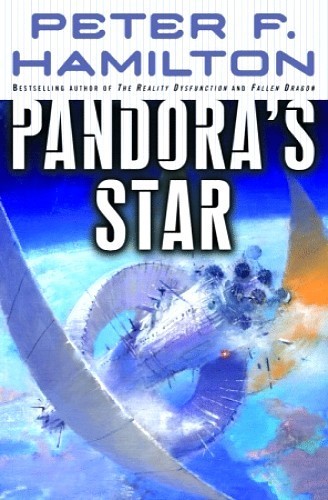 Pandora's Star
recently appeared on a "most popular" science fiction list using reddit as its source. I have had the book for a while, including a paperback version that became part of my beach reading in mid-May. It's a monster of a book and one of two in a duology.
Pandora's Star
recently appeared on a "most popular" science fiction list using reddit as its source. I have had the book for a while, including a paperback version that became part of my beach reading in mid-May. It's a monster of a book and one of two in a duology.The story starts with the spotting of two stars that disappear. Some investigation determines that artificial barriers were activated around the stars. Why? Did some alien within the systems need to be contained or were they protecting themselves? Either way, humanity must investigate to determine the potential risks to the Commonwealth, a collection of human inhabited worlds connected by wormhole stations. Meanwhile, the Guardians of the Self are convinced that an ominous alien, called the Starflyer, is behind the exploration of the disappearing stars.
Peter F. Hamilton fills a thousand pages with characters, descriptions, and action, and the interest of them is a bit scattered for me. The most interesting characters are Paula Myo and Wilson Kime. Myo is a detective who has been hunting the Guardians of the Self's leader, Bradley Johannson, and primary strategist and smuggler, Adam Elvin. She's been on the case for over a hundred years (people routinely go through a process known as rejuvenation, which effectively makes them immortal, as well has having their memory backed up). Myo was "rescued" from a planet that followed an Aldous Huxley model of genetically tweaking people for expertise in specific tasks, and Myo is a fantastic detective, though the Guardians elude her (because of the Starflyer?). We follow her method and near misses. Dedicated, focused, and no nonsense, she proves several times to be sympathetic and faces her moral crisis at the end of the book fully aware of the risks.
Wilson Kime landed the first human expedition on Mars, only to be upstaged by Nigel Sheldon and Ozzie Isaac, creators of the first wormhole generators. After many rejuvenations, he is selected by Sheldon to lead the exploration of the barrier star, called Dyson Alpha. He eventually leads a follow up scouting mission and becomes the first admiral of the Commonwealth navy. He's out to reclaim some of that lost glory and because he loves exploration.
Ozzie has a whole sequence of parts that I did not like. He teams up with a kid who alternatively seems like he's two and then 18. Ostensibly, Ozzie is seeking what the alien Silfden, a fey, carefree culture, know of the Dyson barrier. Ozzie grew up in surfer culture California and says "dude" far too often for my taste.
I found quite intriguing the SI character: the AI created by humanity who stores the human memories. The SI has an interest in the Dyson barrier, but it is enigmatic and its interest and motivations are mysterious, which is why it is intriguing.
Hamilton knows how to describe various planets and technologies with ease. His ideas on rejuvenation, the Dyson aliens, wormholes, and a host of technologies are wonderfully executed and thought out. However, I found many of the descriptions unnecessary, word padding. Also, much of his dialogue seemed overly wrought--some of the interactions between couples were particularly galling.
Still, the scope and the characters he does do well lead me to a lukewarm four stars. Pandora's Star is definitely the set up for book two, which I will read.
Review can also be read at Goodreads.com.
Published on June 13, 2013 05:00
June 11, 2013
Ringworld: A Review
 I decided to re-read Ringworld over vacation, for it had been years since I read it. The novel has always reminded me of Rendezvous with Rama: the exploration of a vast alien artifact. Obviously, with many differences, but nonetheless, a "similar" feel. In both cases, the mystery of the novel is the mystery of the artifact: how it was created and why was it created and what the heck happened?
I decided to re-read Ringworld over vacation, for it had been years since I read it. The novel has always reminded me of Rendezvous with Rama: the exploration of a vast alien artifact. Obviously, with many differences, but nonetheless, a "similar" feel. In both cases, the mystery of the novel is the mystery of the artifact: how it was created and why was it created and what the heck happened?Louis Wu, a 200-year old human, is approached by Nessus, a Puppeteer. Nessus asks Wu to join a crew that will explore an ancient artifact. Along with Nessus and Wu, Teela Brown--a young woman who for a time is Wu's lover, and Speaker-to-Animals, a Kzin, join the expedition. The novel itself is basically the exploration's vessel crashlands, they seek to find an escape, and learn a bit about the ringworld and other things. Much of the novel deals with interspecies differences and how they approach those differences along with the effect of Teela's and Louis's age difference. This greatly simplifies the plot, but that is the essence of it. What matters in this novel is the exploration and character interactions, which is what has made it a classic. The world is richly developed, retaining its mystery despite several hundred pages. Wu, Teela, Speaker-to-Animals, and Nessus are given lots of room be themselves and interact. I found Nessus the most interesting, for he has as much mystery--as do the Puppeteers in general--as the ringworld. I found Teela to be the most uninteresting primarily because she is too one-dimensional, I think--as if Niven was over emphasizing her youthfulness and boxed her into that pattern.
Still, this is a novel well worth reading. It is deserving of its classic status.
This review is also on Goodreads.
Published on June 11, 2013 05:00
June 6, 2013
The Spy Who Came in from the Cold: A Review - SPOILERS
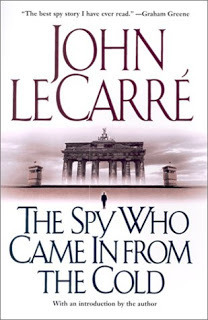 The Spy Who Came in from the Cold is the novel that propelled John le Carre into bestseller-dom. After reading the book, it's easy to see why.
The Spy Who Came in from the Cold is the novel that propelled John le Carre into bestseller-dom. After reading the book, it's easy to see why.Le Carre provides a tautly written thriller with excellent characterization. Alec Leamas, station chief for the UK Berlin intelligence office, appears in the novel awaiting the arrival of Karl Riemeck, an agent of Leamas's to arrive from East Berlin. Leamas has had a hard time recently. His agents have been picked off one-by-one, and Riemeck is his last. A car arrives carrying Riemeck's girlfriend, who knows the truth. Leamas realizes that Riemeck has been reckless, which is born out when Riemeck is shot dead before crossing the border.
The rest of the novel is about Leamas and Circus's plan to exact vengeance on Hans-Dieter Mundt, the head of East German intelligence, who Leamas holds responsible for the death of his agents. The method to achieve this revenge is pretty straightforward: Leamas will act the part of a fired and disgraced intelligence officer descending into alcoholism, providing a target for turning against the UK. Leamas and Circus has set up a series of transactions to implicate Mundt and get the East Germans to take care of Mundt. As Leamas acts his part, he falls for a co-worker in a library, Liz Gold. In the end, Circus was actually protecting Mundt and bringing down Mundt's rivals in the East German service, for Mundt is the UK's man on the inside. Gold was brought over to help destroy Mundt's rival, but in hers and Leamas's attempted escape back to the West, both are killed. Leamas turned back for Gold and the circle of the novel is complete: Riemeck dies at the Berlin Wall for trusting his girlfriend. Leamas dies at the Wall for falling in love.
Control throughout the novel remains mysterious, and his larger plan to protect Mundt is hidden from Leamas and the reader, revealing a cold-blooded calculation that Leamas admires even as he realizes his has been used. The novel is not filled with extraneous description, keeping close to Leamas's and Gold's points of view. As in Tinker, Tailor, Soldier, Spy, I admire the way le Carre writes Control, an enigma even to his direct subordinates. The Circus seems enigmatic as well, a mystery to itself and its employees, which is probably the nature of spy agencies. Leamas, in contrast, is clear: He wants revenge on Mundt and is willing to go very far to do so. Gold is his weakness. Fatality, as it turns out.
Le Carre is a master. Read the book.
This review can also be found on Goodreads.
Published on June 06, 2013 05:00
June 4, 2013
Sideloaded NOOK Book Covers: Why No Thumbnails?
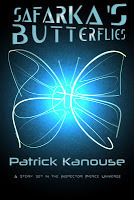 A few weeks ago when I was preparing my story "Safarka's Butterflies" in ebook form, I stumbled across a problem. I was opening the ebook in Kindle, iBooks, Kobo, and NOOK to do some quality control. The cover appeared wonderfully in the Kindle, iBooks, and Kobo but not in NOOK--even though iBooks, Kobo, and NOOK used the same ePub file. Well, after a bit of searching, I found an answer on the B&N support pages, but it took a bit of digging. I offer it here.
A few weeks ago when I was preparing my story "Safarka's Butterflies" in ebook form, I stumbled across a problem. I was opening the ebook in Kindle, iBooks, Kobo, and NOOK to do some quality control. The cover appeared wonderfully in the Kindle, iBooks, and Kobo but not in NOOK--even though iBooks, Kobo, and NOOK used the same ePub file. Well, after a bit of searching, I found an answer on the B&N support pages, but it took a bit of digging. I offer it here.Open the ePub in Calibre (a free ebook manager).Ensure the cover appears in Calibre.Close Calibre.Open the exact same ePub file in Sigil (a free ePub editor).In Sigil, click Save (you don't need to change anything.Reopen Calibre.Select the book in Calibre and click Convert Books. This opens the Convert dialog box.Ensure that the Input Format and Output Format say EPUB.Click OK. The file is converted.Now when you sideload to your NOOK, you'll have a cover.
Published on June 04, 2013 05:00
May 30, 2013
"Safarka's Butterflies": A Free Short Story Ends Soon
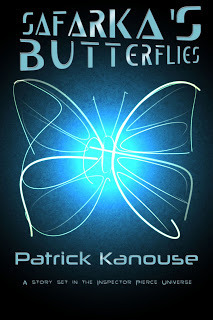 This short story will be available for free for only 8 more days.
This short story will be available for free for only 8 more days.When a stranger pawns a mysterious object, Ton Nax encounters a world of dreams that are not his. Could they be a portal to someone else's experience? As Ton uncovers the truth, the reality is even more terrifying than he thought.
A short story set in the Inspector Pierce universe.
Get this short story for free by paying with a Tweet or Facebook Like. Just click here to "pay" or here to "pay."
This ebook is only available from now to June 7th.
Also, if you sign up for my newsletter, I'll send you the free download link as well.
Published on May 30, 2013 05:00
May 28, 2013
Star Trek: Into Darkness - A Review - SPOILERS
 SPOILERS
SPOILERSStar Trek has, apparently, the "stuff" for longevity, for revisiting, for finding new paths of reinvigoration. Roddenberry created something special, and his continued pursuit to see his creation on screen has been rewarded. J.J. Abrams second entry in the Star Trek mythos is something of a masterpiece. It is true to Roddenberry's vision without being weighed down by it. Star Trek II: Wrath of Khan is a classic sci-fi movie, and one that, I think, propelled the later movies and series. If you have not seen the original "Space Seed" episode that introduced Khan or Wrath of Khan, then I suggest you do if possible. The movie has many references (winks and otherwise) that will only enrich your viewing.
So Star Trek: Into Darkness itself. Kirk (Chris Pine) violates the Prime Directive to save Spock (Zachary Quinto) and is demoted to Commander under his mentor, Admiral Pike (Bruce Greenwood). This opening sequence sets a lot of the ensuing tension in the movie between the characters: Kirk and Spock (the always interesting emotional, gut part of Kirk against the logical, analytical Spock), Spock and Uhura (Zoe Soldana), and Kirk against himself. One of Roddenberry's strokes of genius was to give Spock a half-human/half-Vulcan background while emphasizing the Vulcan. This allows appeals to Spock's human side. Quinto plays Spock engagingly and the script really allows any "emotion" that comes out of Spock to appear entirely natural and in character. Several scenes emphasize this conflict between Spock and Kirk and Spock and Uhura.
This movie, however, is really about the "maturing" of Kirk. Emotional, damaged, and reckless, Kirk lives by his gut and measures his success by the fact he has never lost a member of his crew. Pike's death and, more importantly, Khan (Benedict Cumberbatch) provide the impetus for Kirk to place others before himself. Khan's one focus is saving his crew regardless of cost, and this meaning of being a leader empowers Kirk to make his crew his primary focus while his innate morality (why does Kirk violate the Prime Directive? His ethics compel him too) prevents him from descending into the evil of Khan.
I could go on about the dynamics of interpersonal relationships, the consequences of seeing war as inevitable, etc., but I'll just say that this movie explores many themes and generally with a subtlety often absent from filmmaking.
Cumberbatch plays Khan (if you haven't heard that already) superbly. Menacing, tortured, ruthless. This is not a villain that is pure evil, though he borders on it. Rather, Khan has always been a tragic figure. Engineered by humanity to be superior, he is condemned for the superiority. His goal of saving his crew is not unlike Kirk's, but his methods reveal his villainy.
Finally, I found the nods to the original Khan movie and the adjustments (allowed for the alternative timeline established in Abrams first Star Trek movie) to storyline both respectful and entirely within keeping of the movie.
Star Trek: Into Darkness is a well-made, finely acted, entertaining film. I highly recommend it.
Published on May 28, 2013 05:00



